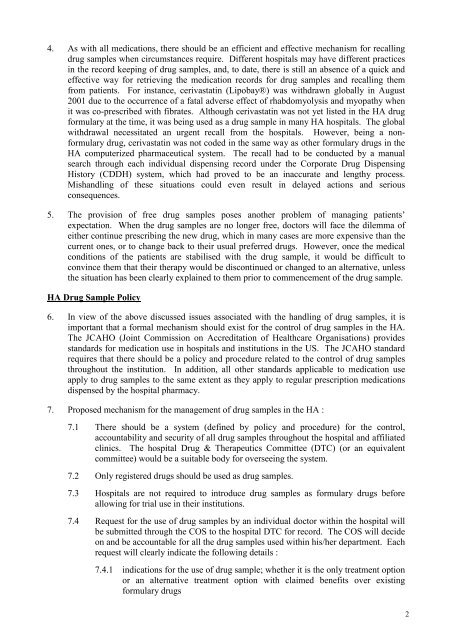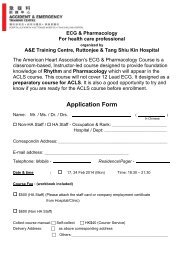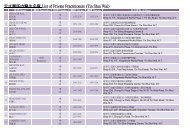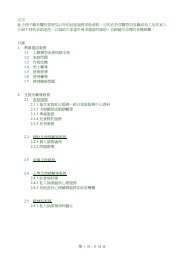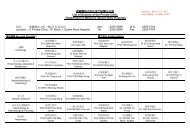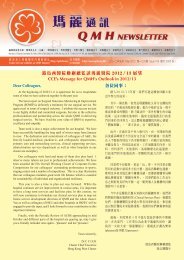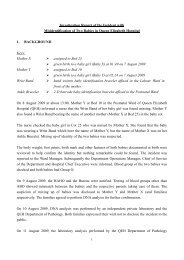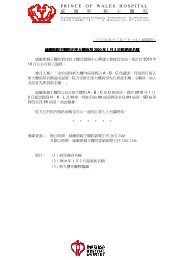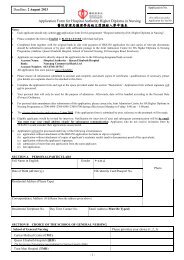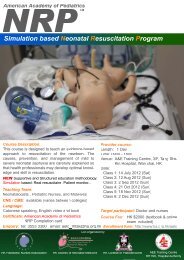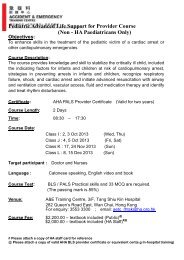2005 Edition Report on Drug Administration Procedure & Practices ...
2005 Edition Report on Drug Administration Procedure & Practices ...
2005 Edition Report on Drug Administration Procedure & Practices ...
Create successful ePaper yourself
Turn your PDF publications into a flip-book with our unique Google optimized e-Paper software.
4. As with all medicati<strong>on</strong>s, there should be an efficient and effective mechanism for recallingdrug samples when circumstances require. Different hospitals may have different practicesin the record keeping of drug samples, and, to date, there is still an absence of a quick andeffective way for retrieving the medicati<strong>on</strong> records for drug samples and recalling themfrom patients. For instance, cerivastatin (Lipobay®) was withdrawn globally in August2001 due to the occurrence of a fatal adverse effect of rhabdomyolysis and myopathy whenit was co-prescribed with fibrates. Although cerivastatin was not yet listed in the HA drugformulary at the time, it was being used as a drug sample in many HA hospitals. The globalwithdrawal necessitated an urgent recall from the hospitals. However, being a n<strong>on</strong>formularydrug, cerivastatin was not coded in the same way as other formulary drugs in theHA computerized pharmaceutical system. The recall had to be c<strong>on</strong>ducted by a manualsearch through each individual dispensing record under the Corporate <strong>Drug</strong> DispensingHistory (CDDH) system, which had proved to be an inaccurate and lengthy process.Mishandling of these situati<strong>on</strong>s could even result in delayed acti<strong>on</strong>s and seriousc<strong>on</strong>sequences.5. The provisi<strong>on</strong> of free drug samples poses another problem of managing patients’expectati<strong>on</strong>. When the drug samples are no l<strong>on</strong>ger free, doctors will face the dilemma ofeither c<strong>on</strong>tinue prescribing the new drug, which in many cases are more expensive than thecurrent <strong>on</strong>es, or to change back to their usual preferred drugs. However, <strong>on</strong>ce the medicalc<strong>on</strong>diti<strong>on</strong>s of the patients are stabilised with the drug sample, it would be difficult toc<strong>on</strong>vince them that their therapy would be disc<strong>on</strong>tinued or changed to an alternative, unlessthe situati<strong>on</strong> has been clearly explained to them prior to commencement of the drug sample.HA <strong>Drug</strong> Sample Policy6. In view of the above discussed issues associated with the handling of drug samples, it isimportant that a formal mechanism should exist for the c<strong>on</strong>trol of drug samples in the HA.The JCAHO (Joint Commissi<strong>on</strong> <strong>on</strong> Accreditati<strong>on</strong> of Healthcare Organisati<strong>on</strong>s) providesstandards for medicati<strong>on</strong> use in hospitals and instituti<strong>on</strong>s in the US. The JCAHO standardrequires that there should be a policy and procedure related to the c<strong>on</strong>trol of drug samplesthroughout the instituti<strong>on</strong>. In additi<strong>on</strong>, all other standards applicable to medicati<strong>on</strong> useapply to drug samples to the same extent as they apply to regular prescripti<strong>on</strong> medicati<strong>on</strong>sdispensed by the hospital pharmacy.7. Proposed mechanism for the management of drug samples in the HA :7.1 There should be a system (defined by policy and procedure) for the c<strong>on</strong>trol,accountability and security of all drug samples throughout the hospital and affiliatedclinics. The hospital <strong>Drug</strong> & Therapeutics Committee (DTC) (or an equivalentcommittee) would be a suitable body for overseeing the system.7.2 Only registered drugs should be used as drug samples.7.3 Hospitals are not required to introduce drug samples as formulary drugs beforeallowing for trial use in their instituti<strong>on</strong>s.7.4 Request for the use of drug samples by an individual doctor within the hospital willbe submitted through the COS to the hospital DTC for record. The COS will decide<strong>on</strong> and be accountable for all the drug samples used within his/her department. Eachrequest will clearly indicate the following details :7.4.1 indicati<strong>on</strong>s for the use of drug sample; whether it is the <strong>on</strong>ly treatment opti<strong>on</strong>or an alternative treatment opti<strong>on</strong> with claimed benefits over existingformulary drugs2


